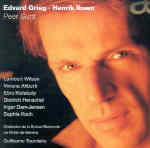This bizarre release couples a performance of the complete sung and played music from Peer Gynt, recorded in Geneva in 2000, with the necessary dialogue in the melodramas and action numbers from a 2004 Paris production. The former is sung in Norwegian, and the latter is spoken, shouted, or whispered in French, making for a rather ridiculous mixture of languages, since anyone looking to understand all of the words necessarily needs to have the texts available in print while the music is being played. It also obviously limits the appeal of this issue beyond France and French-speaking territories, while causing a bit of sonic mayhem as a result of the different acoustics involved. The singers and instrumentalists issue from a large, reverberant space, while the voices leap out of the speakers, right and left, from no recognizable acoustic perspective at all. It all culminates in the most hideously awful account of the Shipwreck episode ever recorded, with trashy “special effects” (crashing; sea noises) adding to the cacaphony.
The musical performances also are less than wonderful. Inger Dam-Jensen’s Solveig can be heard to better effect on RCA’s disc of Peer Gynt selections conducted by Temirkanov. Taken live, the playing and singing are basically vulgar, very loud in the big moments, but with so much emphasis on percussion, and such strange balances, that in numbers such as In the Hall of the Mountain King the thematic material in the orchestra isn’t audible at all. In this same number, conductor Guillaume Tourniaire, who shows no special affinity for this music, indulges in an especially gratuitous lurch from slow to fast.
In all honesty, this isn’t difficult music to play or conduct. All it needs is a feeling of freshness and flow, and that’s exactly what is missing here. Consider Morning Mood, where Tourniaire milks the opening phrases to such a degree that the music refuses to blossom naturally (and note the nasal timbre of the Suisse Romande cellos). Just about everywhere you look, his pacing is slightly off, his phrasing mannered. Peer Gynt’s Homecoming, for example, consists of loud explosions followed by dead silences. There’s no line, and no tension, from one moment to the next. Evidently Tourniaire has not learned that noise and excitement are not musically synonymous.
Making matters even stranger, Aeon includes as a “bonus” a single disc containing all of the musical numbers without the French dialogue. What for? Where is the bonus in being forced to pay for two full-priced CDs so that you can acquire an additional free one because you find the entire raison d’être of those two “non bonus” discs unattractive in the first place? Is anyone that dumb? Never mind. Why not just buy an excellent single-disc selection giving you basically the same music, such as Paavo Järvi’s recent Virgin Classics release, featuring better singing, playing, conducting, and sonics? And if you want the complete score with dialogue, BIS’s SACD release featuring the Bergen Philharmonic under Ole Kristian Ruud sets a standard that this release doesn’t begin to approach. In short, this is a non-starter, an uncompetitive, provincial effort that might have been musically entertaining heard once, in performance in Geneva in July 2000, but that never should have been offered for international release.
































